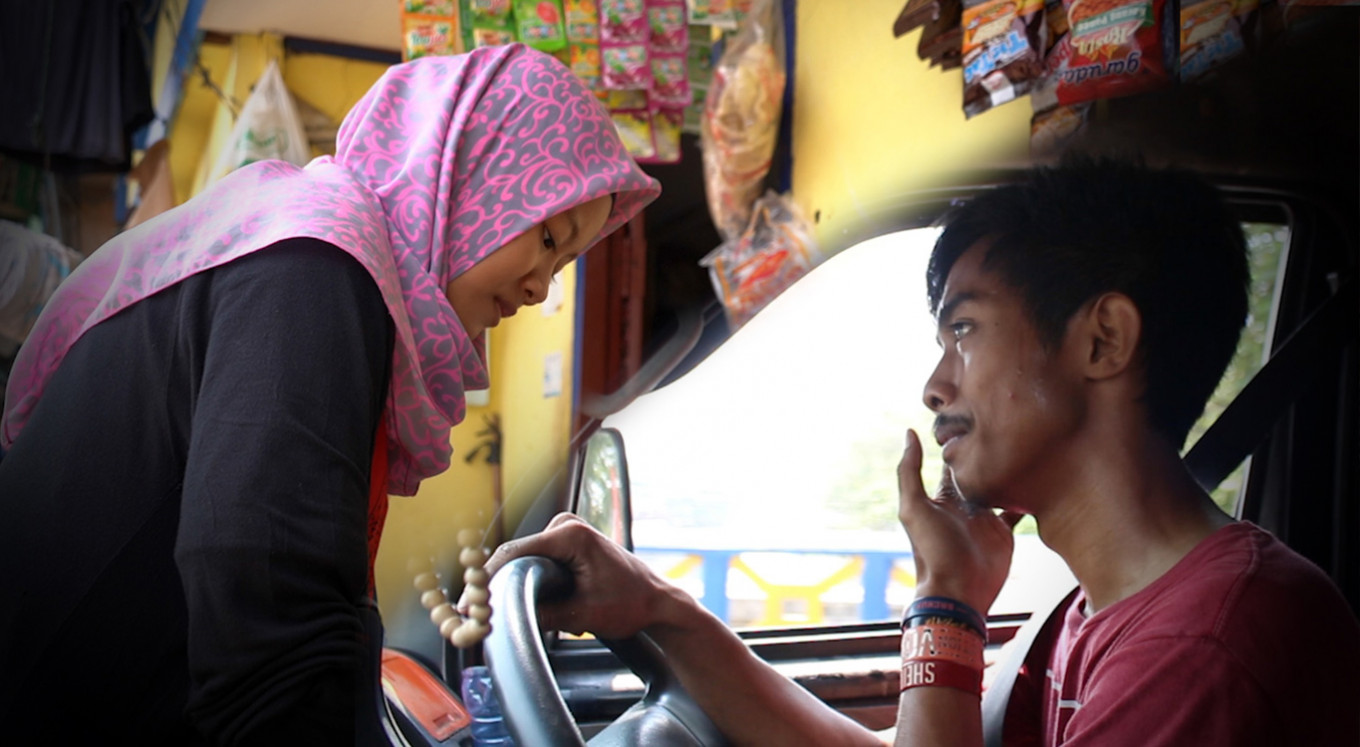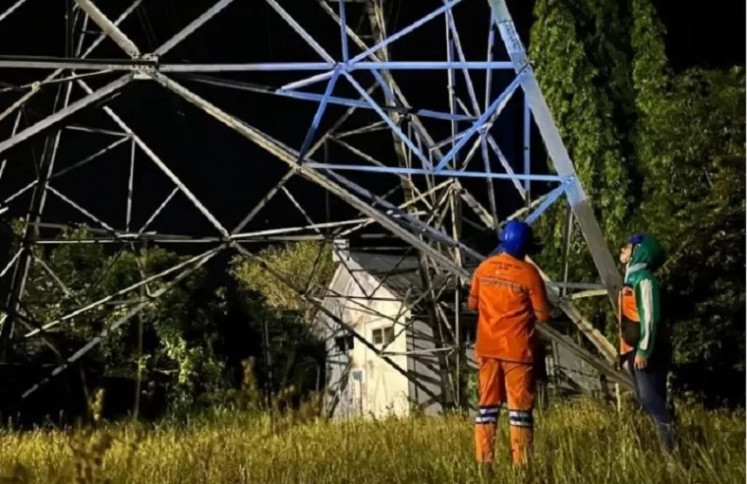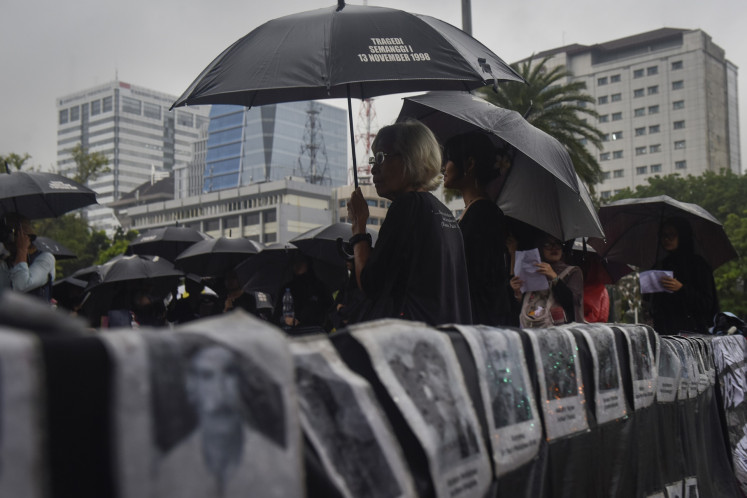Popular Reads
Top Results
Can't find what you're looking for?
View all search resultsPopular Reads
Top Results
Can't find what you're looking for?
View all search resultsJokowi must give underprivileged millennials more attention. They deserve it
Their dreams are simple enough. But for Indonesia’s young and poor achieving them could take years and extra hard work, because government support is unlikely.
Change text size
Gift Premium Articles
to Anyone
P
resident Joko “Jokowi” Widodo has a penchant for millennials and all things millennials supposedly like: startups, innovation and technology.
During his campaign for the 2019 presidential race, Jokowi used a hologram to attract more voters including the young people. He also baited his then-rival, now Defense Minister Prabowo Subianto, with a question about what Prabowo would do to help unicorns. Prabowo responded with a question that made him the talk of the town for days: What are unicorns?
Before he announced his Cabinet lineup, Jokowi promised he would appoint one millennial. This person turned out to be Gojek founder Nadiem Makarim, 35.
In November, sitting on colorful bean bags on Merdeka Palace’s veranda, Jokowi introduced seven young people as presidential expert staff members. Aged 23 to 36, the seven “experts” would advise the President on subjects including education, entrepreneurship, creative industry, disabled rights and religious tolerance.
The young staff include the founder of education technology company Ruangguru, Adamas Belva Syah Devara, and the founder of fintech Amartha, Andi Taufan Garuda Putra. All are university graduates, mostly from institutions abroad: Australian National University, Harvard University, Standford University, Duke University and Academy of Arts in San Fransisco and Oxford University.
One of them, Putri Indahsari Tanjung, is the daughter of entrepreneur and former coordinating economic minister Chairul Tanjung.
Read also: From spokespersons to discussion partners, here are the tasks of Jokowi's new aides
These are impressive young people who have worked hard and created something good for Indonesia. They are people who had received considerable media attention even before the President appointed them to advise him.
They are the faces of Indonesian millennials: successful, creative, coffee-loving and working for or even having established tech companies.
No one knows Tri Adhitia Diantomo or Adit, 22, and Riska, 22.
In our January report, The Jakarta Post followed one day in the lives of the two millennials to get a glimpse of “the other millennials”. While under the radar, poor young people actually outnumber their privileged counterparts.
The Wittgenstein Center for Demography and Global Human Capital has revealed that only 14.4 percent of millennials in Indonesia have any post-secondary education in 2020, while just 0.38 percent have graduate degrees.
Adit’s latest education was junior high school, and that places him in a category with 20.97 percent of the millennials in 2020. Riska’s was senior vocational high school, which makes her one among 41.11 percent of her generation.
Adit lives in a 25-square-meter house in North Jakarta with nine relatives, while Riska spends most of her days in her parents’ house with her young son. Stay-at-home moms represent the biggest chunk of our millennial population. Riska also represents the sandwich generation that must take care of their children while caring for parents. Riska’s father was a truck driver before he fell ill.
In 2018, Ariane Utomo, Iwu Utomo and Peter McDonald wrote a research report in Inside Indonesia, titled “The other millennials”. The article summarized their seminal work in 2009, in which a team of Indonesian and Australian researchers studied Indonesian millennials.
They revisited the research nine years later, a year before the Indonesian election, because many politicians used some ideas about millennials to bolster their campaigns. These politicians, backed by the media, portrayed millennials as highly paid and working in the creative and tech industries, and sipping latte in Instagrammable cafes.
“Nothing could be further from reality,” the scholars wrote.
Read also: Demographic bonus may be illusory
The reality of Adit and Riska, for example, is far from that of the presidential millennial staff: They don’t start at a level playing field. Adit’s and Riska’s hardship is certainly not the fault of the presidential staffers Adamas and Putri.
But for the government to pay more attention to the privileged ones is certainly faulty logic.
Most of Indonesia’s young and poor are those falling through the cracks of the system. Even though school enrollment is higher than decades ago, the quality of public schools has not improved significantly. And with the race for public schools, many of the poor enroll in low-quality private schools.
Riska, married at 19, does not aspire to travel to Tokyo. Her recreation is limited to Atlantis, the one in Ancol, North Jakarta. Her dream is to have a small business selling groceries, to gain income while taking care of her child. Similarly, Adit dreams of gaining a senior high school-equivalent diploma and open a coffee shop – without wi-fi, so customers would have to talk to each other rather than be glued to their phones.
Their dreams are simple enough. But for Indonesia’s young and poor achieving them could take years and extra hard work, because government support is unlikely.
Jokowi’s administration just launched the Pre-employment Card program, which has been criticized for its budget allocation for online training that no one needs while the COVID-19 crisis strikes people hard.
The training courses are not based on rigorous research about skill gaps but rather on assumed “trends” among millennials. They include video tutorials on becoming a top seller in the unicorn Tokopedia, making silky puddings, sprucing up resumes to apply for scholarships abroad, becoming successful sellers on Instagram and financial planning for freelancers.
Conveniently, one of the training providers is Ruangguru founded by Adamas of Jokowi’s millennial staff. His presence at the Palace put him in the spotlight especially after his colleague Andi Taufan Garuda allegedly misused the Cabinet Secretary’s letterhead to order district heads across Indonesia to facilitate efforts by volunteers from his startup Amartha to gather information on COVID-19.
Read also: Another day, another blunder: Jokowi's millennial staff mired in controversy
While training courses in the pre-employment program might be useful for some, the government should research what underprivileged millennials really need.
Without getting to know the young and the poor and what they really need, the government would fall into the trap of prolonging misleading perceptions about millennials.
Instead of giving the underprivileged millennials what they deserve, the government gives the privileged ones what they don’t deserve.










